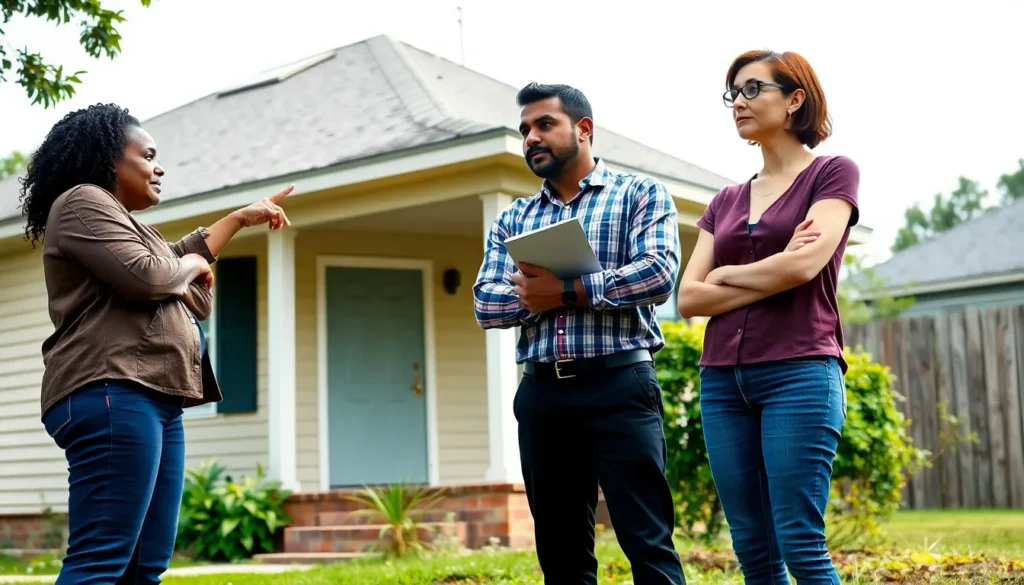Renting a house for the first time can feel like stepping into a game show where the grand prize is a roof over your head. With so many options, it’s easy to get lost in a maze of listings, contracts, and questionable wallpaper choices. But fear not, aspiring tenant! Navigating this world doesn’t have to be a terrifying experience filled with horror stories of hidden fees and rogue landlords.
Understanding Your Needs
Understanding needs is essential when renting a house for the first time. Assessing personal requirements can make the searching process more efficient.
Determine Your Budget
Establishing a budget sets clear financial boundaries. Consider monthly rent, utility costs, and additional fees. Take income and savings into account for a realistic figure. Typical rent should not exceed 30 percent of monthly income to ensure affordability. Create a detailed list of expenses to avoid surprises later on. Remember to factor in potential maintenance costs or deposits, which can add up.
Identify Your Must-Haves
Identifying must-haves streamlines the searching process. List essentials such as the number of bedrooms, proximity to work or school, and access to public transport. Prioritize features like a pet-friendly policy or a backyard. Evaluate both physical attributes and location specifics. Define non-negotiables and flexible options for a more efficient selection. Emphasize preferences without losing sight of budget constraints or availability.
Searching for the Right Property

Finding the right property involves careful research and strategy. First-time renters should utilize every resource available to identify suitable houses.
Utilizing Online Resources
Online platforms like Zillow, Realtor.com, and Craigslist serve as valuable tools. Each site lists rental properties, complete with amenities and images. Analyzing multiple listings helps to pinpoint preferences effectively. Saving searches allows quick access to new options that meet specific criteria. First-time renters can also set alerts for properties within budget. Checking reviews on local neighborhoods offers insights about lifestyle and safety. Social media groups often share rental opportunities directly from landlords, providing a unique advantage.
Working with Real Estate Agents
Real estate agents simplify the renting process for first-timers. Agents understand local markets and have access to listings not available to the public. By discussing personal preferences, renters receive tailored recommendations. Scheduling property tours through these professionals saves time and effort. Agents can negotiate rental terms on behalf of clients, ensuring favorable agreements. Many real estate agents offer free consultations, making it economical to seek their expertise. Utilizing their knowledge leads to informed decisions and a smoother renting experience.
Viewing Properties
Viewing properties represents a crucial step in the renting process. Engaging with the space firsthand helps assess its suitability.
Preparing Questions to Ask
Before attending viewings, prepare a set of questions. Clarifying expectations aids in making informed decisions. Inquire about the monthly rent, security deposit, and included utilities. Asking about lease terms, maintenance responsibilities, and tenant policies is essential. It’s wise to confirm the duration of the lease and whether there are options for renewal. Understanding the pet policy seems necessary for animal owners. Consider asking previous tenants about their experiences. Gathering this information allows for a comprehensive evaluation of each property.
What to Look for During a Viewing
Focus on specific features during each viewing. Inspect the condition of appliances and fixtures, looking for signs of wear or potential issues. Examine walls for damage or mold, as these can indicate underlying problems. Notice the layout and flow of the space, ensuring it meets lifestyle requirements. Evaluating natural light and airflow contributes to comfort. Check overall security, observing locks, alarms, and neighborhood safety. Take notes on gut feelings about the property, as intuition often provides valuable insight. Assess parking availability and nearby amenities for convenience. Ultimately, thorough evaluations during viewings foster sound decision-making.
The Application Process
The application process involves several steps to secure a rental property effectively. Gathering necessary documents early can simplify this process.
Required Documentation
First, prepare essential documents like proof of income, credit history, and references. Applicants often present pay stubs or bank statements to verify financial stability. A solid credit report demonstrates reliability to landlords. Besides these, gathering personal identification, such as a driver’s license or passport, is crucial. Keeping everything organized in a folder can streamline submission and ensure nothing is overlooked.
Understanding the Lease Agreement
Reviewing the lease agreement carefully is vital before signing. Landlords typically outline important terms like rent amount, security deposit requirements, and lease duration. Understanding policies related to pet ownership, maintenance responsibilities, and termination clauses protects tenants later. Clarifying uncertainties with the landlord can prevent future disputes. Renegotiating any unfavorable terms becomes easier with a thorough understanding of the lease details, enabling a smoother renting experience.
Moving In
Moving into a new rental house brings excitement. Ensuring a seamless transition enhances the experience.
Setting Up Utilities
First, contact utility providers for essential services. Electricity, water, gas, and internet installation often require advance scheduling. Research local providers to find competitive rates. Gather personal information such as identification and proof of residency to streamline the process. Setting up accounts before moving in can prevent delays. Remember to verify the start date for each service to ensure everything functions upon arrival.
Tips for a Smooth Transition
Planning tasks ahead eases the moving process. Create a checklist detailing necessary steps from packing to unpacking. Enlist friends for support—having extra hands simplifies heavy lifting. Organize belongings systematically using labeled boxes to facilitate easy access. Familiarizing oneself with the new neighborhood promotes a sense of belonging. Explore local amenities and services, which aids in settling in quickly. Staying connected with the landlord or property manager can provide assistance with any settling issues.
Renting a house for the first time can be both thrilling and challenging. By following the outlined tips and strategies, first-time renters can navigate the process with confidence. Understanding personal needs and establishing a budget are crucial steps that pave the way for a successful search.
Engaging with real estate agents and thoroughly evaluating properties can lead to informed decisions. Additionally, preparing for the application process and ensuring a smooth move-in can set the stage for a positive rental experience. With the right approach and mindset, first-time renters can turn this new chapter into a rewarding adventure.











